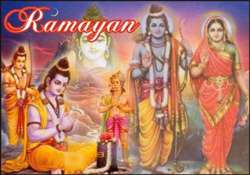Ramayana in Arabic unveiled in Jaipur Lit Fest
Jaipur, Jan 26: An Arabic version of the “Ramayana” translated by noted Lebanese poet Wadi-al-Bustani was released at the Jaipur Literature Festival here Saturday. The book, titled “Ramayana”, will promote cross-cultural understanding and appreciation of

Jaipur, Jan 26: An Arabic version of the “Ramayana” translated by noted Lebanese poet Wadi-al-Bustani was released at the Jaipur Literature Festival here Saturday.
The book, titled “Ramayana”, will promote cross-cultural understanding and appreciation of each other's spiritual heritage, Syed Shahid Mahdi, vice president of the Indian Council for Cultural Relations (ICCR), said at its unveiling.
Mahdi stressed the importance of cultural cooperation between India and the Arabic world, as he welcomed the delegates from Kalima, a cross-cultural translation and publishing initiative from Abu Dhabi.
He said that “every culture has a Ramayana” and it was a profound act of humanity to share each other's most powerful stories. Festival co-director Namita Gokhale received the first copy of the book.
ICCR president Suresh Goel said: “This is an important sharing of secular values through the translation of the great epics, which represent both the Indian faith and mythic imagination.”
The book, titled “Ramayana”, will promote cross-cultural understanding and appreciation of each other's spiritual heritage, Syed Shahid Mahdi, vice president of the Indian Council for Cultural Relations (ICCR), said at its unveiling.
Mahdi stressed the importance of cultural cooperation between India and the Arabic world, as he welcomed the delegates from Kalima, a cross-cultural translation and publishing initiative from Abu Dhabi.
He said that “every culture has a Ramayana” and it was a profound act of humanity to share each other's most powerful stories. Festival co-director Namita Gokhale received the first copy of the book.
ICCR president Suresh Goel said: “This is an important sharing of secular values through the translation of the great epics, which represent both the Indian faith and mythic imagination.”